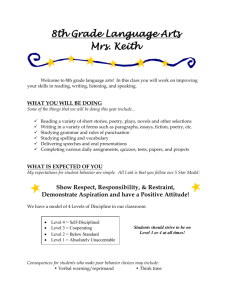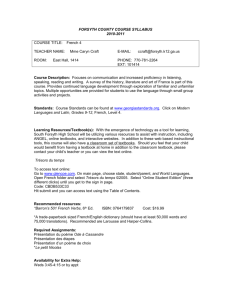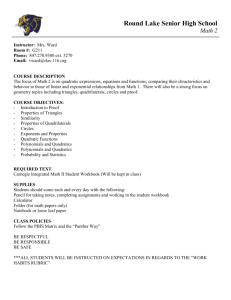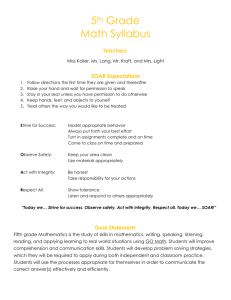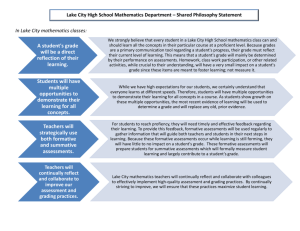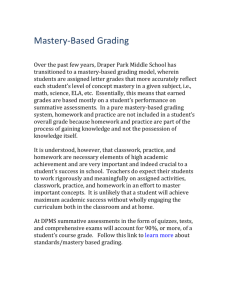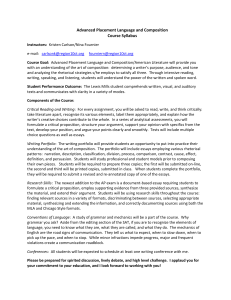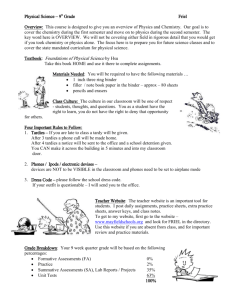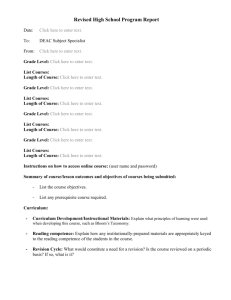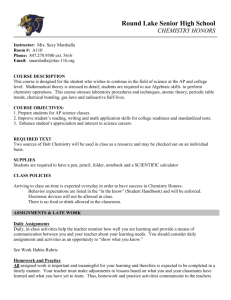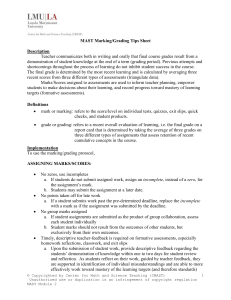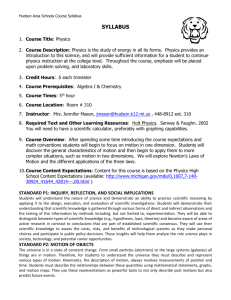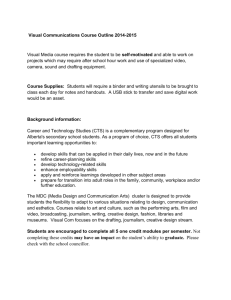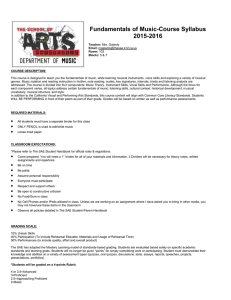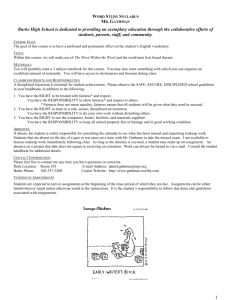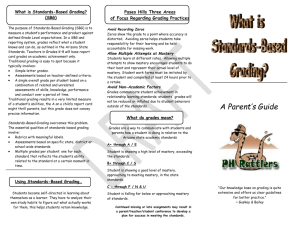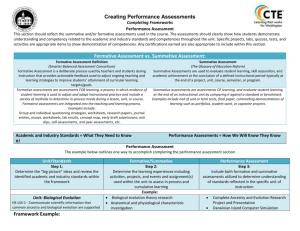Writing Syllabus
advertisement
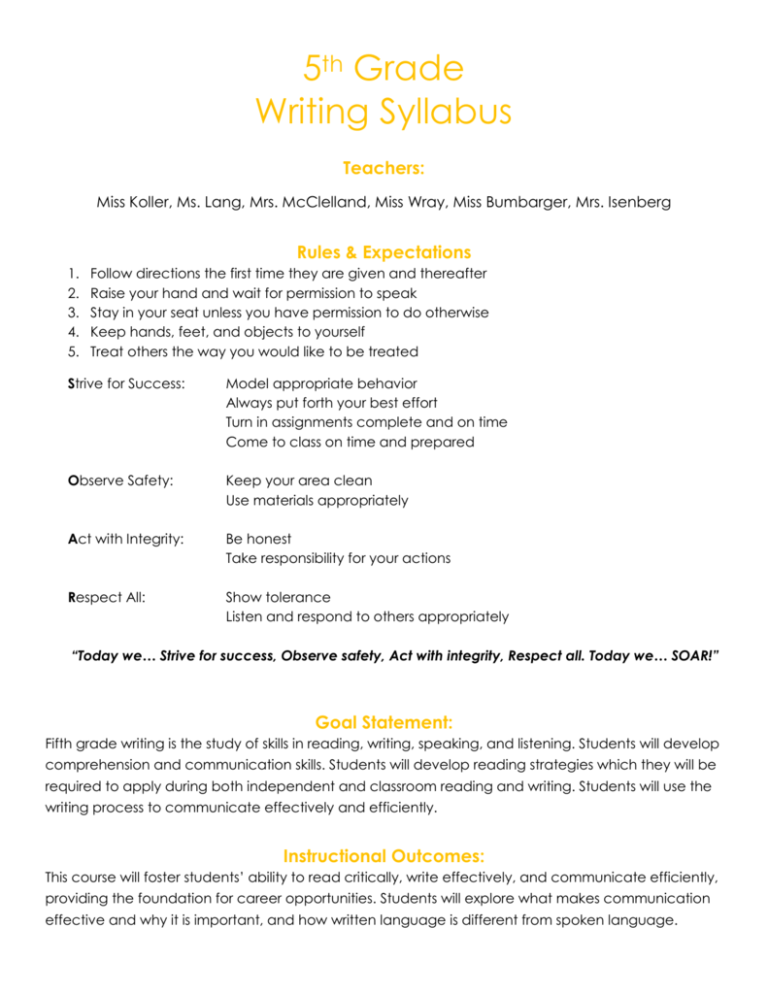
5th Grade Writing Syllabus Teachers: Miss Koller, Ms. Lang, Mrs. McClelland, Miss Wray, Miss Bumbarger, Mrs. Isenberg Rules & Expectations 1. 2. 3. 4. 5. Follow directions the first time they are given and thereafter Raise your hand and wait for permission to speak Stay in your seat unless you have permission to do otherwise Keep hands, feet, and objects to yourself Treat others the way you would like to be treated Strive for Success: Model appropriate behavior Always put forth your best effort Turn in assignments complete and on time Come to class on time and prepared Observe Safety: Keep your area clean Use materials appropriately Act with Integrity: Be honest Take responsibility for your actions Respect All: Show tolerance Listen and respond to others appropriately “Today we… Strive for success, Observe safety, Act with integrity, Respect all. Today we… SOAR!” Goal Statement: Fifth grade writing is the study of skills in reading, writing, speaking, and listening. Students will develop comprehension and communication skills. Students will develop reading strategies which they will be required to apply during both independent and classroom reading and writing. Students will use the writing process to communicate effectively and efficiently. Instructional Outcomes: This course will foster students’ ability to read critically, write effectively, and communicate efficiently, providing the foundation for career opportunities. Students will explore what makes communication effective and why it is important, and how written language is different from spoken language. Requirements: All assignments will follow Pennsylvania State Common Core Standards. Assignments will include argumentative, informative, and narrative readings and writings, as well as conventions and vocabulary. Scope and Sequence 1. Informational Writing 2. Narrative Writing 3. Opinion Writing Editing and Grammar will be embedded throughout each type of writing. Assessments: Pre-Assessments: Pre-assessments will be given at the beginning of each unit to gain an understanding of individual preparedness for new learning, specific learning differences among students, and where to begin curriculum goals. Teachers will differentiate instruction, guide wholegroup instruction, plan learning activities that address varying levels of readiness, determine which students have/have not achieved mastery of specific objectives, identify problems that might cause students difficulty with mastery of an objective, form flexible groups, and determine master level of individuals or small groups based on pre-assessments. Formative Assessments: Formative assessments will be incorporated daily into classroom instructional practices, which will include quizzes, daily work, demonstrations, work samples, work samples, sketches, drawings, diagrams, logs, records, journals, drafts, graphic organizer, exit slips, preview, review, direct questions, systematic observation, and discussions. Formative assessments provide information needed to adjust teaching and learning while they are happening in order to get direct, constant feedback. Feedback will be given based on product, process, and progress. Providing feedback allows students to be a part of the learning environment and to develop self-assessment strategies that will help with their own metacognition. Summative Assessment: Summative assessments are used to evaluate student learning at the end of an instructional unit by comparing it against the pre-assessment. Summative assessments can include end of unit tests, papers, projects, or presentations. Grading Policy: Type 1 Writing Type 2 Writing Type 3 Writing Type 4 Writing A+ 97-100% B+ 87-89% C+ 77-79% D+ 67-69% A 96-96% B 83-86% C 73-76% D 63-66% A- 90-92% B- 80-82% C- 70-72% D- 60-62% F 0-59% Make-up Work Guidelines: Students will be given the opportunity to make up missed work and tests after being absent. It is the responsibility of the student, upon returning to school, to contact the teacher for make-up work and to complete that work. Students will have one school day for each day they were absent to make up assignments. It is the responsibility of the teacher to provide make-up work for absences. A student will be given a reasonable amount of time for make-up work. Teachers will use their discretion to further extend that time when necessary. If the students has been absent for more than one day, they will be given one additional day to prepare before they take a test. They may be given more time if their absence was extended. If a student fails to complete a test/assignment that has been rescheduled by a teacher due to absences, the grade automatically become a zero. If a student arrives late to school, he or she is responsible for contacting the teacher that day to take any test scheduled or submit work due that day. Failure of the student to contact the teacher or make up the work within the time allotted will result in a zero for a grade. Students are to make up all work missed during a suspension or absence from school. Grades will not be lowered for disciplinary reasons. A “class participation” grade may be lowered if the student’s lack of attendance prevents him/her from making a meaningful contribution to class. Both students and parents will be informed of this circumstance, as well as the principal. Notes: It is the student’s responsibility to keep up with class work and ask the teacher about his/her progress. It is the teacher’s responsibility to notify first the student, prior to notification of the parents/guardian, when the student’s class average falls below a C. Progress reports will be sent home to all students midway through the marking period. They must be signed by a parent or guardian and returned within 5 days or by the date assigned. Teachers are granted the flexibility with the procedures they use for grading the students in the classroom. In order to truly measure each individual student’s understanding and mastery of the material, it may be necessary to alter their grading procedures and assessment options. Authentic and informal assessments will be used, along with formal assessment procedures, to ensure that all students are given equitable opportunities to demonstrate their understanding and mastery of class material, taking full advantage of all learning modalities. Curving of grades may occasionally be necessary to equalize the playing field, not in lieu of creatively assessing student understanding.

